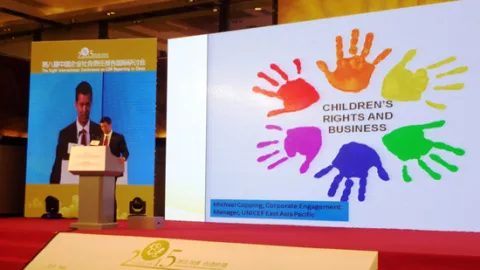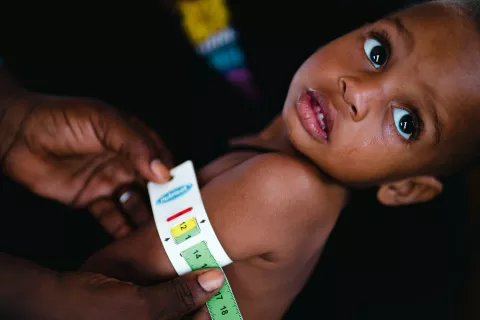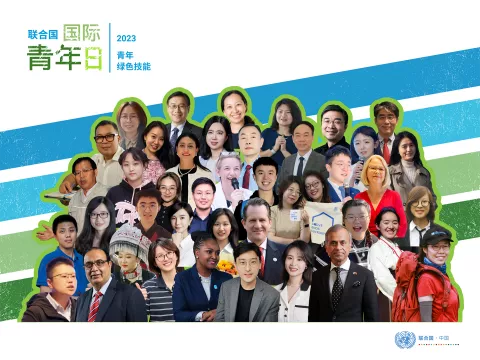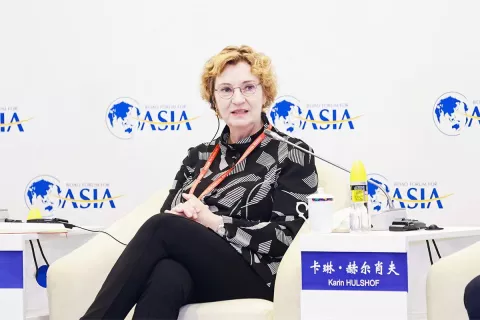Joint commitment to sustainable development through an equitable, open, all-round and innovative approach
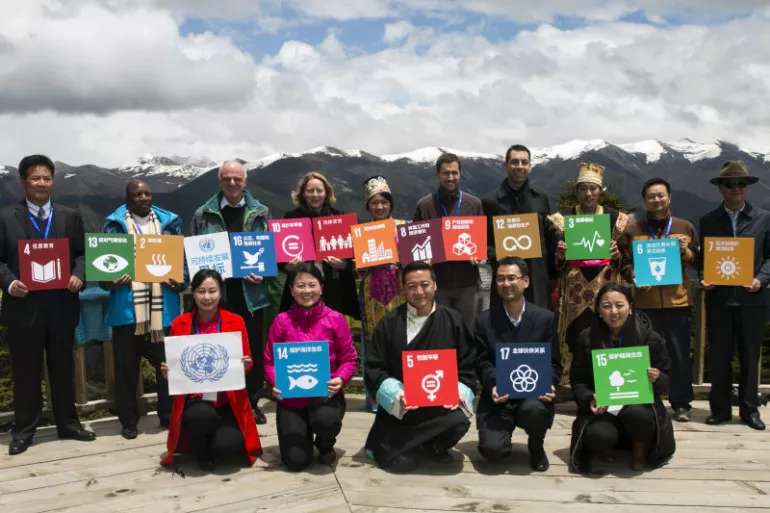
- Available in:
- 中文
- English
Linzhi, 30 May 2016 – The United Nations (UN) System and the Ministry of Foreign Affairs (MOFA) today jointly hosted a high-level symposium in Linzhi Municipality, Tibet Autonomous Region in P. R. China, to demonstrate the joint commitment to the 2030 Agenda for Sustainable Development with its 17 Sustainable Development Goals (SDGs)
The Symposium, Implementing the 2030 Agenda for Sustainable Development: Through an Equitable, Open, All-round and Innovative Approach, was organized as one of the major kick-off events between the UN System in China and the Chinese government following the adoption of the SDGs by world leaders at the 70th UN General Assembly last September.
The 2030 Agenda is a people-centered, universal, transformative and integrated plan. It recognizes that ending poverty must go hand-in-hand with fostering economic growth and addressing a range of social needs, while tackling climate change.
“China has demonstrated great leadership and made remarkable commitments to advance the 2030 Agenda. I am pleased that China has pledged to eradicate poverty in the country by 2020, increase south-south cooperation, and focus action to tackle climate change,” said Mr. Ban Ki Moon, the UN Secretary-General in a recorded video statement.
Chinese Foreign Minister Mr. Wang Yi, in a video message, expressed that: “China will follow the path of innovative, coordinated, green, open and shared development. We will open up wider with more practical measures and a greater sense of responsibility to work with the rest of the world to advance the 2030 Agenda and continue to contribute to global sustainable development.”
While commending China's valuable experiences in achieving the Millennium Development Goals and commitments to the SDGs, Mr. David Nabarro, the UN Secretary-General's Special Advisor on the 2030 Agenda, also pointed out challenges ahead and called for “localizing goals and targets – maintaining their indivisibility but adapting them to national and sub-national circumstances”. He stressed that “the women and men that will benefit from the SDGs need to be consulted and own development action”.
Mr. Luosang Jiangcun, Chairman of the Government of Tibet Autonomous Region (TAR), reiterated the commitment to integrating the green, open, sharing and harmonious development principles into local development. Stating that that Tibet has one of the most well-preserved ecological systems in the world, he said that the government would endeavor to set the TAR on the sustainable track of achieving further economic growth and social progress without compromising the environment.
“Indeed development is the fundamental way out for tackling the various challenges and addressing the root causes of conflicts.” Mr. Zhang Jun, Director-General of the Department of International Economic Affairs of Ministry of Foreign Affairs added. He said that we should usher in a new development stage with better quality, higher efficiency and upgraded structure.
The Symposium brought together over 100 high-level guests from the central and local governments of China, the UN and international organizations, think tanks, academia and civil society to brainstorm on how equitable, open, all-around and innovative approaches can be promoted in support of the SDGs.
It focused on how to achieve early harvest in implementing the 2030 Agenda and the means to realize it; how to integrate the implementation of the 2030 Agenda with domestic development strategies and among different SDGs; and how to provide impetus for the implementation of the 2030 Agenda through innovation in policy making, institutional set-up, technology, economic growth patterns, etc.
It comes at a critical period before the first UN High-Level Political Forum on Sustainable Development in July, where China will be among the first countries volunteering to conduct national reviews on their implementation of the 2030 Agenda.
UN System in China
The UN System in China, consisting of 24 UN funds, programs and specialized agencies resident in China, work in partnership with governmental and non-governmental organizations at various levels to support the Government in implementing its national development objectives as well as Internationally Agreed Development Goals, including the Sustainable Development Goals. The UN System's work in China is guided by the UNDAF 2016 - 2020 focusing on Poverty Reduction and Equitable Development, Improved and Sustainable Environment, and Enhanced Global Engagement.
To learn more about the SDG agenda please go to https://sustainabledevelopment.un.org and also follow hash tag #可持续发展目标# in the Weibo.
Media contacts
About UNICEF
UNICEF works in some of the world's toughest places, to reach the world's most disadvantaged children. Across 190 countries and territories, we work for every child, everywhere, to build a better world for everyone. For more information about UNICEF and its work for children visit www.unicef.org.
| Visit UNICEF China website: www.unicef.cn Follow us on Sina Weibo: http://weibo.com/unicefchina Tencent Weibo: http://t.qq.com/unicef Wechat: unicefchina |


